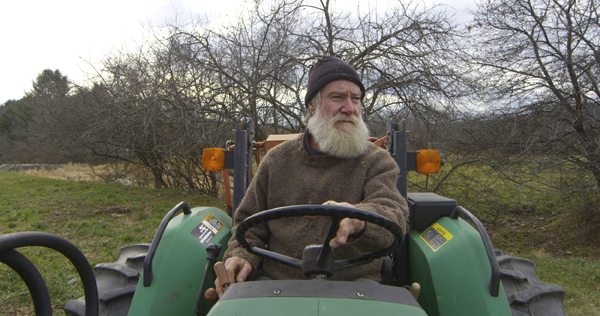The notion that everyone’s life is a story worth telling is a compelling one. Not only is it democratic and egalitarian, but it’s also appealing on a personal level: even your life could be interesting if put in the right framework. Who cares if you spent all day in your PJs watching Bob’s Burgers? Yours is a unique, fascinating soul, waiting to be discovered.
Peter and the Farm puts this theory to the test. The documentary follows a year in the life of Peter Dunning, a 68-year-old man with a magnificent beard who oversees a run-down yet gorgeous organic farm in Vermont. He’s owned it for some 35 years, and over that time, he has been separated from three wives and four children, none of whom keep contact with him anymore.
The film spends roughly half of its 92-minute running time capturing telling details of life on the farm, such as Peter’s herding strategies or the workings of a hay baler. It should be noted that this movie is not for the squeamish; it follows the whole process of butchering a sheep, from the rifle shot to the head to the rough removal of the bulging entrails. Despite the horrors of factory farms, the slaughter makes one yearn for a bit of sterility.
The other half is spent exploring the character of Peter, who gamely earns the camera’s focus. He’s full of wise words and humorous asides (he knows all of the lyrics to West Side Story), but a sense of melancholy follows him everywhere. He often talks of suicide (“Why don’t you document my suicide?” he once asked the director), of the atrophying farm, and of his dependence on alcohol; he wakes up in the night to drink rum to stop the DTs. At one point, he gets into a drunken argument with the filmmakers and gets a little too involved in the spat. Before the camera cuts, he chides himself, saying, “I want to get my voice out of all this shit.” He admits that the film crew is more or less the only group of people he regularly interacts with.
But as winter turns to spring, the mood lightens. Peter seems to remember the beauty of his farm, to remember why he’s been working so hard on it for the latter half of his life. He takes joy from his labor, rather than toiling with a sort of antic frustration. The camera revels in the lush plant life; the wild, knee-high grass; and the cows frolicking in the fields. Still, there’s a sense that winter is always on the horizon. Will Peter still be all right after the film wraps?
So, is everyone’s life a story worth telling? Maybe not, but Peter Dunning’s days are noteworthy enough. The film lets you know him without ever feeling invasive, as Peter is as welcoming as a curmudgeon can be. At its best, the film reminds you of those on the fringes of society, those most likely to fray. With a bit of empathy, perhaps they can be brought back into the fold, if they want to.

















Leave A Comment